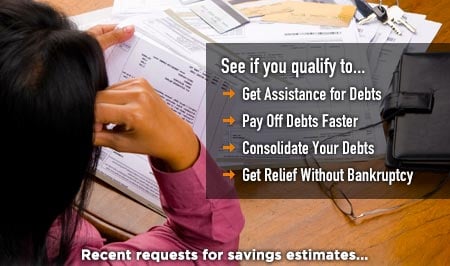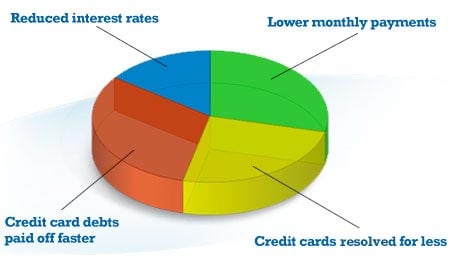
Debt Counseling - Texas
Debt counseling is one of the methods that many Americans these days, including those who live in states like Texas, California, and elsewhere are using to get relief from debt. If you are also in a situation where you are falling behind on your credit card payments, as well struggling with other types of unsecured debts - such as medical bills, utilities, or retail store charges - you may be interested in knowing if you can find relief by consolidating your debts through credit counseling.
Debt consolidation (also called debt management) through credit counseling services typically involves consolidating or combining high-interest credit card debts and other unsecured debts into a single, more structured, and more manageable monthly payment. The goal is, with a more structured and more affordable repayment plan, you can ideally reduce your debts sooner than if you only continued to make the minimum payments at higher interest rates.
In addition, many consumers consider debt consolidation to be a popular alternative to bankruptcy, which is also a form of debt relief, but one that has a more damaging and longer lasting consequence on personal credit.
Find out if you qualify for savings with a free debt relief analysis and savings estimate by answering just a few, simple questions. Start here.
Understanding Credit Counseling
Debt consolidation through credit counseling, or what is also referred to as a debt management plan (DMP), is a proven and legal way for many consumers to get relief from credit card debts and other types of unsecured debts. Before choosing a credit counseling service, it is wise to have a good understanding of how it works, and how it can potentially help you reduce the total amount of your credit card and unsecured debts.
Facilitated by credit counselors, debt consolidation generally begins with a thorough assessment of your financial situation - taking into account your income, financial obligations, and other assets. Once credit counselors have a clear picture of your finances, they will typically develop a debt relief strategy to help you pay off your debts sooner than if you only continued to make the minimum.
With a strategy in mind, they will typically submit proposals to credit card companies, on your behalf, requesting lower interest rates and the waiving of late fees and penalties. Creditors that accept the proposals are added to the debt management plan. Credit counseling agencies, in turn, distribute those funds to creditors that are in the plan.
How Can I Benefit With Credit Counseling?
As mentioned earlier, the goal of debt consolidation through credit or debt counseling is to provide you with a single, more structured, and more lenient repayment plan that can, ideally, help you direct more of your payment into paying off the principal on your credit cards versus just the interest. Aside from requesting proposals to your creditors, reputable credit counseling agencies may even provide you a due date (or the time funds are taken from your account) that takes into consideration when you get paid.
The bottom line is, credit counseling allows many individuals a way to tackle and reduce their debts without seriously damaging their credit history - the way bankruptcy might. That's why it makes sense to find out how much savings you can potentially get through credit counseling.
Click here for a free debt relief evaluation and savings estimate - at no obligation.to you.























